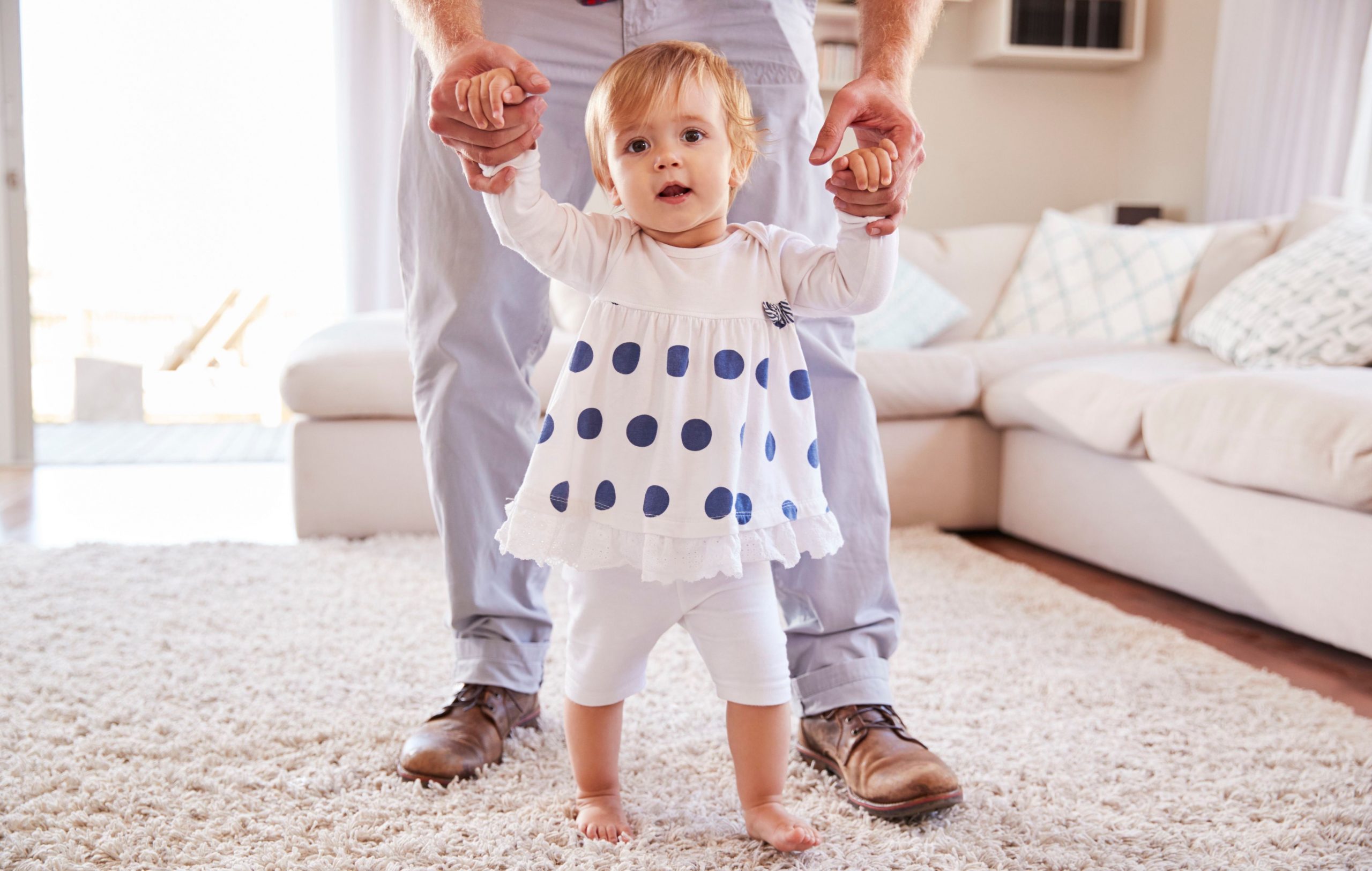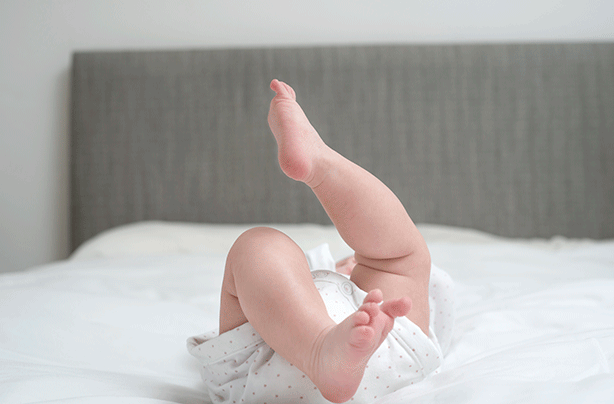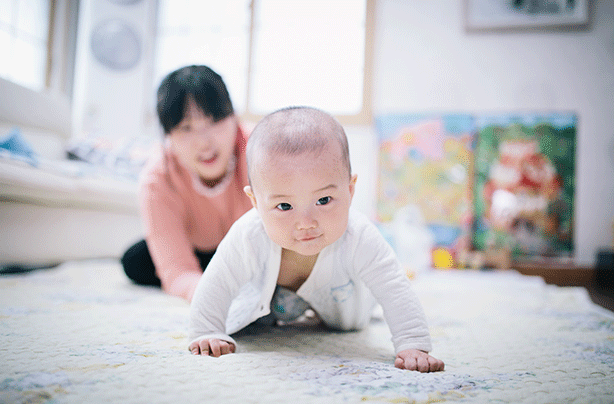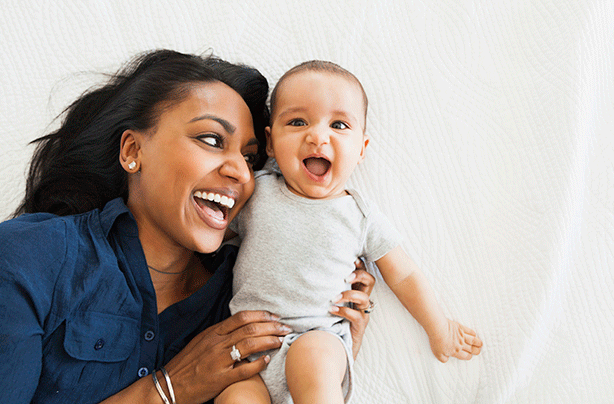Baby development: Baby milestones for your child's first year
What to expect from your child and when

Baby development in your child's first year is an exciting time, with many wonderful baby milestone moments, like when they start crawling, then walking and talking.
However, with your first baby it's only natural to assess baby development by looking at other children the same age and compare what they can do with your child's progress.
Baby milestones are useful because they give you an idea of what to expect from your child and when, so you can prepare yourself and know what's normal for your baby's development.
Child development stages also help you work out what kind of toys and books your baby will enjoy at different ages. They give you a general idea of what's normal, too, so that if your baby seems to be developing at a much slower rate than other little ones, you can get them checked out.
However, it's important to remember that all babies develop at their own pace, so the fact that your child was an early or late crawler is no real indication of his or her intelligence.

If your child reaches their very early baby milestones, like rolling over, and crawling, at a young age, then they'll immediately take a huge leap forward in their development.
This is because these skills open up a new world of experiences and opportunities - for example, moving towards things they want to play with. So, for a while, it'll seem that the early crawler is streets ahead of his peers, doing new and daring things while they sit and watch. However, as soon as the others learn to crawl, they'll take that same leap forward and will quickly catch up.
Parenting advice, hot topics, best buys and family finance tips delivered straight to your inbox.
Another 'leap' occurs when those first steps transform your child from a baby into a toddler, and then again when they learn to tell you their wishes in no uncertain terms. But by the time they start school, they'll all be running, jumping and singing, so no-one will be able to tell who did what first.
Baby development and factors that can affect it
According to psychologist Richard Woolfson, there are several factors that can affect baby development. These include:
Birth position: Firstborns often learn to talk earlier as they're surrounded by adults, while subsequent babies may reach their physical milestones earlier because they have siblings to copy.
Environment: Your child will learn according to the opportunities he or she gets, so make sure they enjoy a variety of activities and get to experience new surroundings.
Personality: Some babies just sit there, taking it all in, while others won't stay in one place long enough to hear what you've got to say. Just like adults, babies all shine in different areas, depending on temperament, likes and dislikes.
Gender: Research shows that boys often reach physical milestones earlier, while girls tend to learn to speak at a younger age and have better fine motor skills.
Another thing to remember is that development doesn't happen at a steady pace, but in peaks and plateaus: your child may seem to make huge progress one week and then spend a while perfecting their new talent before moving on to something new. Also, premature babies may reach their milestones several months later than their peers.
When is baby development normal?
The moments of pride you feel in baby development will be mixed with times of worry that they're not developing as fast as they should be.
If your anxieties are prompted by comparing your child with other babies, then try to ignore them - your little one hasn't read the books and magazines you have and doesn't know the precise date at which they are supposed to reach each milestone! Instead, they'll do things in his own time and according to his own interests and personality, not a timetable describing an 'average baby'.
However, if you do feel that your baby is not developing at the rate you expected, talk to your health visitor or GP. Your baby will have checks during their first year anyway, but you can contact them at any other time if you're worried.
Baby milestones: What to expect and when

Smiling Learning to smile is one of the first milestones and happens at around six weeks. Your baby's first gorgeous smile makes up for all those sleepless nights!
Head first As your baby's neck muscles strengthen, they'll be able to support her own head (at around six weeks) to turn to look at new things and towards the source of sounds.
Roly poly At some time between three and six months your baby will learn to roll over, usually from front to back first, then from back to front a couple of weeks later.
Sitting As your baby's back gets stronger, they'll be able to hold themselves in a sitting position, first with their hands around their waist, and eventually without any support.
Crawling Babies learn to crawl from as early as six months. They usually start by getting on to all fours and rocking backwards and forwards.
Bottom shuffling Of course, some babies don't crawl at all, and develop their own ways of getting around, sometimes just shuffling on their bottoms.
Cruising Before they learn to walk your little one will pull themself up using furniture, or other people's legs! They'll then 'cruise' around the room, holding on to tables and chairs.
First steps Those first, unsupported steps are a major baby milestone, and happen any time from around nine months.
Chatterbox At 18 months, most children use between six and 20 words, although they may only be recognised by you. By two and a half you'll notice a language explosion!
Why isn't my baby crawling?
Here are some of the things that may indicate a problem with your baby's development:
Sound: If they aren't responding to sounds by turning their head or looking up by three months, there could be a hearing difficulty.
Sitting: If your baby can't sit unsupported for short periods by seven months, their muscles may be weaker than expected and may need help with physiotherapy.
Steps: If your child isn't walking by the age of two years, again there may be some muscle weakness. Talk to your health visitor about physiotherapy.
Speech: If your child's speech is still babyish and unintelligible to strangers by the age of four years, they may need some help, perhaps with speech therapy.
Boosting baby development

Peekaboo: At around five months, your little one starts to understand that something still exists, even if they can't see it.
To begin with they'll think you've gone when you hide your face with a blanket, say, and their surprise when you reappear makes them laugh out loud.
But, as the weeks go by, they'll anticipate the peekaboo surprise, even pulling the blanket off themselves to find you underneath!
Clap hands: Co-ordinating both hands to move at the same time and meet in the middle is a skill babies learn between six and eight months.
Try clapping and getting them to copy you, or clap their hands together for them. By around 10 months, they may well even recognise the words 'clap, clap', and do the action when they hear you say the words.
In and out: The perfect toy for a nine or 10 month old is a plastic pot or bowl, and some random objects to put in and take out. Your baby will perfect the skills of picking up and letting go, and learn the idea that one thing can go inside another.
Trusted, informative, and empathetic – GoodToKnow is the ultimate online destination for parents. At GoodtoKnow, our mission is 'simple': we're trying to make sense of parenthood. On the site, you'll find everything you need for a happy, healthy family life. Our huge archive of content includes more than 18,000 articles and 1,500 how-to videos. These include expert-backed advice features on parenting, dealing with relationship changes after having a baby, self-care for mums and managing your family finances. We also feature tried-and-tested product reviews and buying recommendations for every stage of family life - from prams and Moses baskets to birthday gifts and top toys.